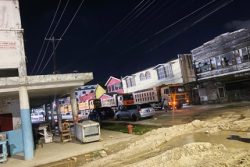Several weeks after the end of the American elections, a recount in Minnesota has the former Saturday Night Live comedian Al Franken a handful of votes away from winning a Senate seat that would keep alive the Democrats’ hopes of having a filibuster proof majority in the upper house. Each stage of the recount has been closely followed by the usual suspects − lawyers, journalists and bloggers – and the process has rekindled all the old debates about the value of each ballot. The incumbent senator, Norm Coleman, initially had a lead of 725 votes but this soon dropped to 206 and has since fallen to fewer than a hundred. Whether or not Franken finally prevails is almost beside the point; what really matters is that the state of Minnesota has shown that it can recount nearly 3 million votes in a reasonably timely, transparent and equitable manner.
Myanmar is the opposite of Minnesota. Almost twenty years after its military rulers suspended the results of an election that should have brought Aung San Suu Kyi to power, the junta is busily preparing itself for “democratic” elections in 2010. Unaccustomed to the exchange of free opinions, yet confident that they can legitimise their government with the semblance of a fair election, the generals have set about tidying the political landscape ahead of the polls. Mostly this has meant sending opponents to jail. More than 100 activists from last year’s pro-democracy demonstrations have been given long prison sentences on a variety of trumped up charges. Zargana, a comedian who has been called the Charlie Chaplin of Myanmar, was recently given a 45-year prison sentence for criticising the government’s mishandling of the relief efforts after Cyclone Nargis; former leaders of the 1988 student revolution have been sent to jail for decades, and so have the monks who led the “Saffron Revolution.” Human rights groups all over the world have successfully raised the public’s awareness of the issue, but until the US and Europe – and, more importantly Myanmar’s neighbours: China, India and Thailand – put their thumb on the scales, there is no real likelihood of political change.
After the invasion of Iraq, there has been an understandable scepticism in the international community about ambitious plans for nation-building and democratisation. Chastened by the experience of bringing democratic institutions to a population with deep ethnic and religious divisions, US foreign policy looks set to return to its pre-Bush ‘realism’ under President Obama. During the next few years the US State Department is likely to engage in far more rhetoric than intervention. That is a mixed blessing. For although the imperial vision of Bush’s neocons has proved a huge setback in the Middle East and elsewhere, its failings should not be allowed to overshadow the usefulness and modernity of open democratic societies. If they do nothing else, functioning democracies teach the invaluable lesson that while senators and presidents may come and go the overall system − with all its imperfections – is serviceable and ought to remain. America itself may be the best illustration of this argument. In the two presidential elections before Obama’s victory, deeply controversial results failed to shake the common voter’s belief that by and large the system still works. Such optimism is barely imaginable in much of Asia, Africa and the Middle East.








